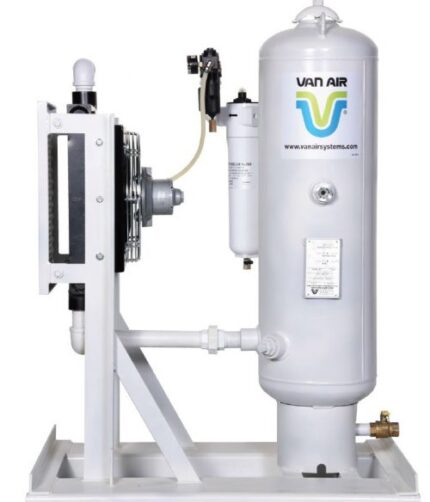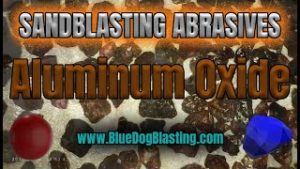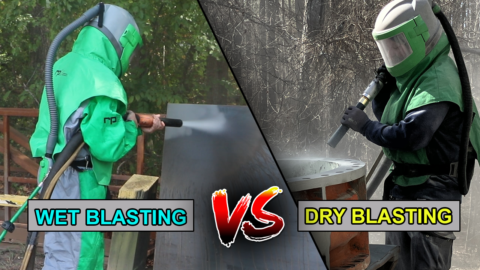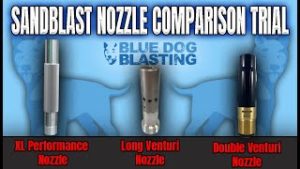How Much Air Do You Need For Your Abrasive Blast Process?
Abrasive Blast Process Air Consumption FAQs
When it comes to air consumption for your abrasive blast process, how much is enough?
How much compressed air do you really need for sandblasting? What are the correct blasting air requirements for your project?
What size hose and nozzle is best for the size of your compressor and pot?
This blog will answer those exact questions and more.
Correct Requirements for Abrasive Blast Process Air Consumption
To determine how much compressed air you need for your blasting needs, you must accommodate for the following things:
- Desired pressure and nozzle size.
- Future growth as your blasting needs change.
- Additional air equipment you might need, including supplied air climate control devices.
- Any drop in pressure through your air hoses and lines.
Supplied Air Control or Temperature Control Requirements
Temperature is an important consideration in your blasting process. Use the following chart to guide you:
Device | CFM Requirement |
C40 Dual Climate Control Devices (hot and cold) | 26 CFM |
Cool Air Tube | Additional 15 CFM |
Hot Air Tube | Additional 15 CFM |
Nozzle and Hose Size Recommendations
The compressor powers your entire blast process. If your compressor cannot keep up with the amount of air exiting your sandblast nozzle, your pot will not remain pressurized. That’s why it’s crucial to ensure your nozzle orifice size and pressures do not exceed the capacity of your compressor.
Nozzle and Hose Size Recommendations
Typically, your nozzle size will tell you the most about how much air you will need. The minimum air requirements for nozzles are as follows:
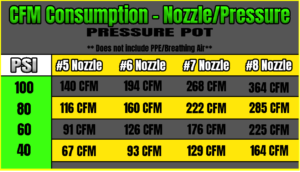
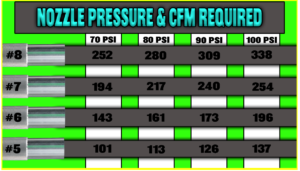
Hose Size for Abrasive Blast Process Air Consumption
When it comes to hose size, here’s the golden rule: Your sandblast hose ID should always be 3-4 times the size of your nozzle orifice.
Additional Rules for Nozzle and Hose Sizes
- The larger the nozzle, the more air required.
- A worn nozzle will also typically require more air than a new nozzle.
- Like nozzle orifice size, the higher the per square inch (PSI) requirement, the more CFM is needed.
- When you raise your nozzle pressure, you raise the CFM requirements of your process.
- The size of your pot mostly affects how much abrasive capacity you will have. The smaller the pot, the more often you have to spend time refilling it. The larger the pot, the longer you can continuously blast before adding the new abrasive.
Abrasive Blast Process Air Consumption Quiz
Let’s say you have a new #5 Sandblast Nozzle and want to blast at 90 PSI on a project. You know the weather is forecasted to be cold in the morning and hot in the afternoon. You want to use your RPB C40 Dual Climate Control Device. You’ve inspected your equipment and confirmed there are no any air leaks or areas of potential pressure drop.
What is the minimum amount of CFM you will need from your compressor?
Answer:
- #5 Nozzle at 90 PSI: requires 126 CFM
- 1 C40 Dual Climate Control Device: 26 CFM
- Minimum Air Requirement: 152 CFM
Additional Considerations When Using An Abrasive Blast Process
Maintaining your air tools for optimal blasting results depends on several factors, including the following:
- Frequent monitoring of nozzles. Check your nozzle orifice on a regular basis. Look for any signs of wear. A nozzle that wears even just 1/16’’ can increase your requirements by more than 50 CFM.
You might even consider using a smaller size to save air. Using a long-wearing Carbide Nozzle would also enable you to maintain the orifice of your nozzle as well. - Avoiding continual blasting. Keep your compressor from overheating by pausing your blast process every five minutes. Allow the compressor to cool so that it doesn’t become degraded. Consider using a pressure hold system, which can reduce the wear on your compressor and decrease fuel costs.
Prevent abrasive material and particulate matter from getting into the air compressor. Do this by adhering to the maximum air pressure requirements for your abrasive blast cabinet. You can also reduce the air pressure to adhere to the proper requirements with the help of a pressure regulator valve, or air regulator.
Need Parts or More Information on Abrasive Blast Process Air Consumption?
Blue Dog Blasting has all of the blast parts, equipment and expertise you need for your next blasting project.
If you’re ready to start shopping, explore all of our products here.
Need help finding a product? Don’t see what you need? Want to talk through your specific needs? Contact us at 888-667-6756 or sales@bluedogblasting.com and our team will be happy to assist you.











































